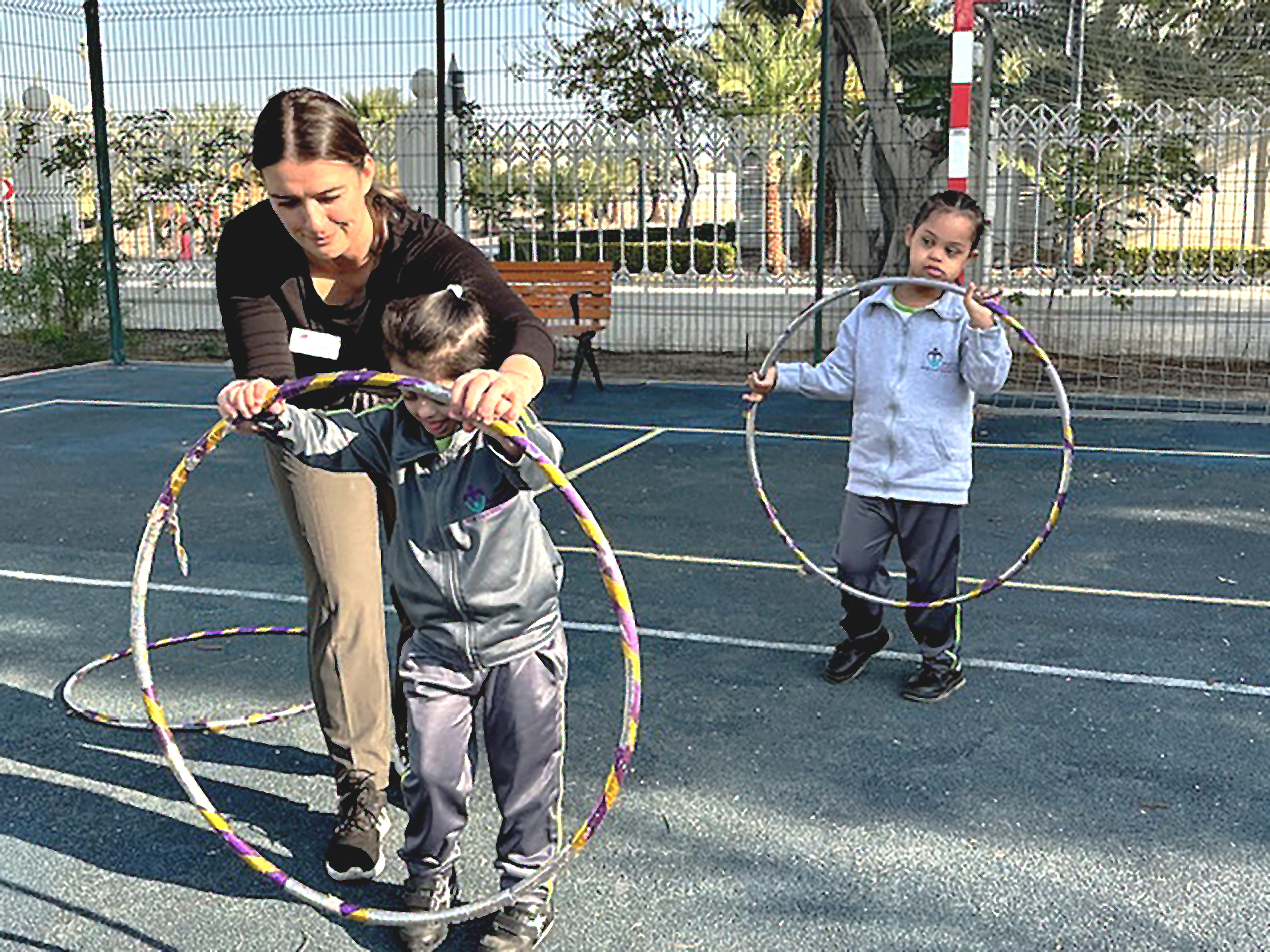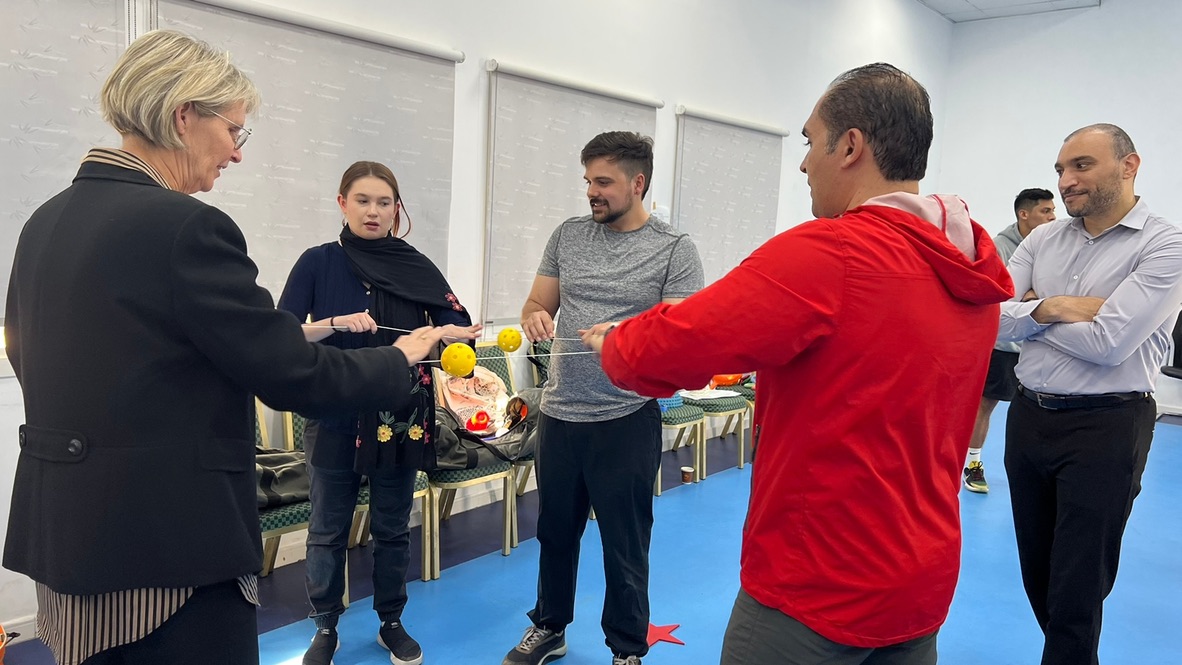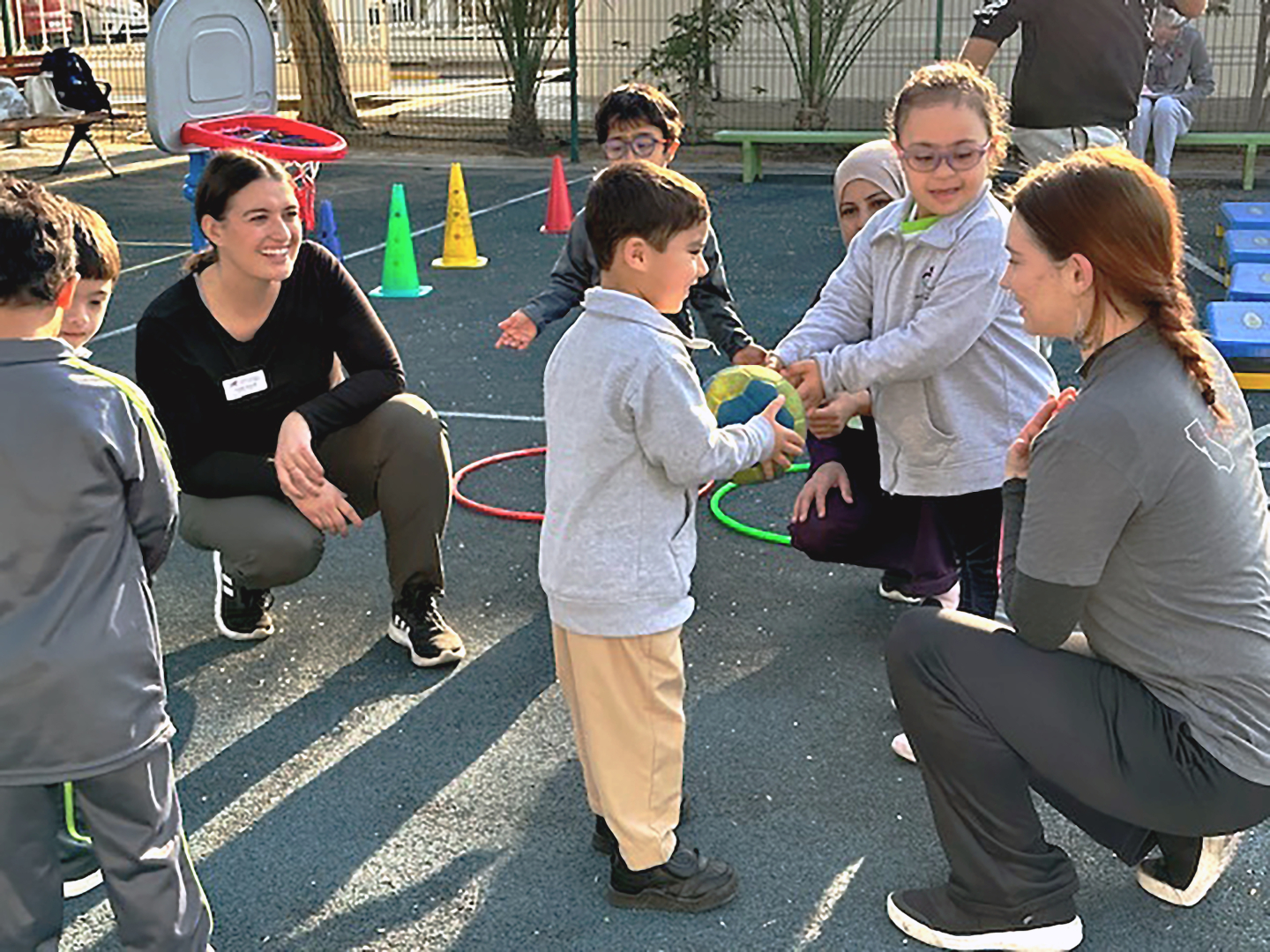Students Embrace Trip to UAE as Moment of Cultural Education, Community

Enrique Bautista-Moreno missed his birthday.
While traveling across the Pacific Ocean from Chico to the United Arab Emirates, the kinesiology major and his peers in adapted physical education (APE) and communication sciences and disorders flew across the international dateline. While Bautista-Moreno missed his annual celebration, he was more eager about what awaited in the days to come—as he and his peers from Chico State had the chance to observe, learn from, and make recommendations for programs for children with physical and cognitive disabilities.
During the 8-day whirlwind trip, they toured a new school in Khor Fakkan, visited sites to observe teachers in their environments, and debriefed each day on what they saw, connecting it to their coursework and hands-on experiences back in California.
“It was an incredible chance to observe everything we had been studying at Chico State in another culture firsthand,” Bautista-Moreno said. “As I was witnessing a class, I saw several of the techniques we have studied being used for physical exercises and we had the chance to utilize our expertise in order to suggest programs for kids with physical and mental difficulties.”
The trip was organized and facilitated by kinesiology professor Rebecca Lytle, who has maintained a decades-long friendship with Sheikha Jameela bint Mohammed Al-Qasimi (Psychology, ’83; Honorary Doctorate of Humane Letters, ’22), the chairperson of Sharjah City for Humanitarian Services. The two met about 10 years ago when Sheikha Jameela came to visit her alma mater. They discussed their programs for individuals with disabilities and Sheika Jameela shared information about her annual “Al Amal” Camp for children and teachers.
She invited Lytle to bring university students on a trip, so they joined the camp the following year to assist with motor activities. After staying in touch over the years, they reconnected in person when Sheikha Jameela returned to Chico State in 2022. It was then she and Lytle realized another experiential learning trip was long overdue.
“It’s a meaningful experience no matter where you go in the world,” Lytle said. “You see that we all have these similar challenges as humans with changing attitudes and perceptions, with acceptance, with respecting diversity. It’s a natural bond when you interact with people who have that similar vision.”

The primary goal of the trip was to better understand the adapted physical education program at Sharjah City for Humanitarian Services; how it functions, how its teachers function, and its needs and opportunities for growth. The secondary but equally important goal, Lytle said, was for students to engage in experiential learning in an entirely different culture.
“I really wanted to demonstrate the importance of international relations and getting students to have a true experience of what the Middle East is like—it’s not what they see in the news and media,” she said. “It’s a wonderful place, and people are kind. People are people all over the world, and as these students tell 10 other people of the impact this trip had on them, what they learned there, to me, that’s most important, it has a ripple effect.”
In their reflection papers, the students were unequivocal in how the experience gave them a real understanding of a culture that, for the most part, they had little prior understanding of. Some even had trepidation before going, largely driven by stereotypes and a lack of knowledge.
“I had anxious feelings about traveling to a country with culture and customs I was not familiar with,” said kinesiology major Drew Jones. “Once there, I felt so special being able to go to all those amazing places, not because we asked, but because they wanted us to be immersed and truly feel welcomed into their world. It was an experience I will never forget, not because of the place, but because of the people.”
Ultimately, four kinesiology majors with options in APE, two speech pathology majors, Lytle, and Professor Jessika Lawrence, took part in the trip. They were also joined by Tonya Moore (Kinesiology, ’03), the 2022–23 president of the California Association for Health, Physical Education, Recreation and Dance, who works as a coordinator of physical education and health for Los Angeles County Office of Education, which provides special education services for more than 1.5 million children.
Sheikha Jameela generously funded the trip as part of a gift in 2022–23 to Chico State, in addition to support for state-of-the-art laboratory and service equipment for the Child Development Program and technology in the Communication Sciences and Disorders Program.
Having the chance to visit other schools and see how adapted PE is implemented or how speech pathology is offered–even here in the United States—is rare, Lytle said.
“Having an opportunity to go to another country and see multiple professionals in multiple settings is a huge benefit, especially as you discuss the similarities and differences from what you see in your student training program and clinical placements,” Lytle said. “Do they look at curricula the same way we do? What are our strengths and weaknesses, and what are theirs?”

The students admired the lack of behavioral issues in many of the classrooms, which can be a challenge they witness often here in the United States. The climate of the classrooms was one where all the students were engaged and cooperative. They also said they were inspired by the number of women in the clinics, which showed a commitment to gender equity and representation; they gained self-confidence as they were asked for their thoughts and advice even though they have not yet completed their degrees; and they were repeatedly overwhelmed by the kindness and welcoming spirit with which they were greeted.
“Having the opportunity to travel across the world and experience a new culture is something I will forever cherish. It was amazing to see that no matter where you are in the world, people are people. We all have feelings, emotions, wants, and needs,” said graduate student Coral Imhoff, who is working on her master’s in speech pathology.
“And being able to observe the children with disabilities in the school setting was truly inspiring,” she added. “Seeing how the teachers interacted with their students with such care and kindness was something I will never forget. My faith in humanity grew from this trip and for that I am very grateful. What I know now about the UAE is what I wish every person in America could know.”
That’s exactly the spirit Lytle was hoping for.
“What’s most meaningful to me is providing opportunities and changing attitudes. That’s why I got into APE. It’s the same thing when you take students to a different culture. It’s changing our world for the better,” Lytle said.
One of Bautista-Moreno’s most memorable moments came one night while sharing dinner with a group of international music therapists. To make up for his missed birthday, the group sang him “Happy Birthday” in English, and then his peers followed in Spanish, his first language. Adding to the delight, the educators from the UAE added a version in Arabic, and visiting educators from South Korea gave their own rendition in Korean.
In that moment, they used their various languages to embrace their commonalities in a true spirit of inclusivity.
For Bautista Moreno and his peers, that language was universal. It was a gift.


